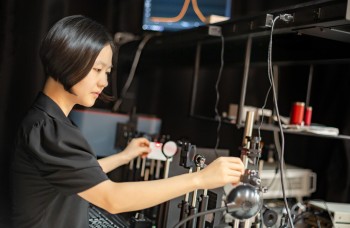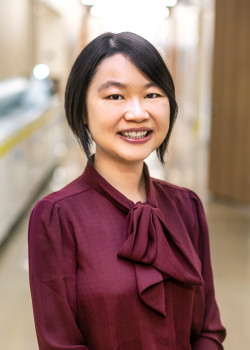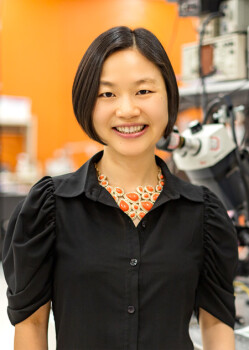
Optical fiber, which uses light to transport vast amounts of data quickly between computers and other electronic devices, has revolutionized modern society, from the high-speed internet that flows into our homes to global communications. But the microchips that power everything from smartphones to spacecraft still rely on electrical currents to carry data signals within and between the chips.
A University of Texas at Dallas researcher is looking to bring the blazing speed of light down to the microchip level by investigating the use of light, instead of electricity, to transport data on the chips themselves.
 Dr. Qing Gu
Dr. Qing Gu, assistant professor of
electrical and computer engineering at The University of Texas at Dallas, recently received a
National Science Foundation Faculty Early Career Development (CAREER) Award to expand her work on novel lasers.
The grant will provide $500,000 over five years.
Gu’s research in the
Erik Jonsson School of Engineering and Computer Science focuses on developing on-chip lasers for microchips that use light instead of electricity to transport data on the chips. Such
photonic integrated circuits would help facilitate faster and more efficient data transfer, but they need an on-chip light source. These on-chip lasers can also have applications in bio- and chemical-sensing.

Dr. Matthew Gardner and Dr. Qing Gu, both assistant professors in the
Erik Jonsson School of Engineering and Computer Science at The University of Texas at Dallas, are the inaugural recipients of the Texas Instruments Early Career Award in Electrical and Computer Engineering.
 Optical fiber, which uses light to transport vast amounts of data quickly between computers and other electronic devices, has revolutionized modern society, from the high-speed internet that flows into our homes to global communications. But the microchips that power everything from smartphones to spacecraft still rely on electrical currents to carry data signals within and between the chips.
Optical fiber, which uses light to transport vast amounts of data quickly between computers and other electronic devices, has revolutionized modern society, from the high-speed internet that flows into our homes to global communications. But the microchips that power everything from smartphones to spacecraft still rely on electrical currents to carry data signals within and between the chips.

 Dr. Matthew Gardner and Dr. Qing Gu, both assistant professors in the
Dr. Matthew Gardner and Dr. Qing Gu, both assistant professors in the